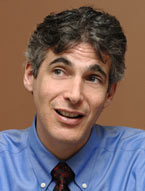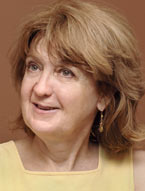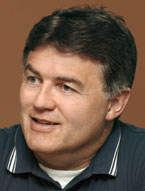Inside Iowa State
Inside ArchivesSubmit newsSend news for Inside to inside@iastate.edu, or call (515) 294-7065. See publication dates, deadlines. About InsideInside Iowa State, a newspaper for faculty and staff, is published by the Office of University Relations. |
June 29, 2006 Faculty team finds roots of student cheatingby Mike Ferlazzo, News Service Most people know the difference between right and wrong, and they consider cheating to be among the latter. But whether it be a student on an exam, a corporate executive's fraud to employees and shareholders, or a spouse's affair, people cheat anyway. Why? Because they distance themselves from their unethical actions -- they rationalize it -- according to a study co-authored by College of Business faculty members and their former colleague. Management assistant professor Jeffrey Kaufmann and professor Brad Shrader joined with accounting professor Sue Ravenscroft and former accounting professor Tim West (now at the University of Arkansas) to study the behavior of nearly 50 students from another Midwestern university who had cheated on a take-home exam. They co-authored a paper titled "Ethical Distancing: Rationalizing Violations of Organizational Norms," which will be published in an upcoming issue of the Business and Professional Ethics Journal. The research stems from a situation that West encountered a few years ago while teaching an introductory course in managerial accounting. He gave students a take-home test problem and requested that they complete it individually, without help from other students or the Internet. West was unaware that a fellow faculty member at the school had posted an answer key to the problem on the Internet. Students soon discovered the online key and many accessed it. But unknown to them, the school was able to track all who had accessed it. West learned that at least 47 of his 64 students had cheated on the test. That's when he called Ravenscroft. "We talked and I said, 'You know, it would really be nice to know why they did it -- I can't believe they would have done it to you.' So I said 'Can you ask them?,'" Ravenscroft said. "I said, 'Hey, you know what, let's make lemonade here. Let's try and understand cheating.'" West threw out the test results and collaborated with his co-authors on the data collection instrument -- persuading students to anonymously answer a series of questions about what they did and why. There was a 100 percent response rate -- all students in the class chose to respond. "We were just lucky to get this incredible data that normally you don't get," Kaufmann said. "You usually have suspicions of cheating and things like that, but rarely do you have, 'Yeah, we cheated, and let me put on paper why we did it.'" The test results are inIn an earlier study from the data, researchers reported that there was no significant difference between cheaters and non-cheaters in their ability to reason morally. They found that all but two students knew the difference between right and wrong -- and that the core behavior was wrong and could be considered cheating. In the current paper, they wrote that students tried to distance themselves from the wrongfulness of cheating using four types of rationalization. Students:
"The students seem to view it as an issue of reciprocity, and we view it only as an issue of academic integrity," Shrader said. "A student will look at a cheating episode as a referendum of how they've been treated -- by the institution, or expectations by parents, or by peers. A student may rationalize and say, 'I'm simply giving back to the system what it gives to me' in a way." Cheating is big business"You can learn a lot from this in business, where you see people who do bad things," Kaufmann said. "If you put that on paper and put it up on the board and said, 'Did you do this and know it's bad?,' and they'd say, 'yes.' But they don't see themselves as bad people, or doing bad things." Shrader, who teaches business ethics, believes the cheating behavior research has its greatest applications to business -- and specifically business schools. "This may be viewed a bit as a survival technique or a form of entrepreneurship -- a life skill," he said. "In some of the literature we've reviewed -- more popular press than academic press -- there was a sense that cheating was seen as a skill that can be developed and something you can become good at. It will be useful and have payoffs -- the concept that 'cheaters win.'" "I actually think this is more business-oriented than a lot of other people do," Kaufmann said. "From an abstract level, what we study is how people behave in organizations -- especially on the management side. And this is how people behave in organizations." Because of the applications, this study has seemed to draw greater outside interest than some of the team's more classic business research. "I think it's sort of ironic from a faculty point of view," Ravenscroft said. "On one hand, theoretically this is not the topic in any of our areas. But in terms of reality, it's pressing, it's timely, and everybody else is really interested in it." They plan to present their findings at an October forum organized by the Center for Excellence in Learning and Teaching. |

Jeffrey Kaufmann 
Sue Ravenscroft 
Brad Shrader Quote"We were just lucky to get this incredible data that normally you don't get. You usually have suspicions of cheating and things like that, but rarely do you have, 'Yeah, we cheated, and let me put on paper why we did it.'" Jeffrey Kaufmann, assistant professor of management |